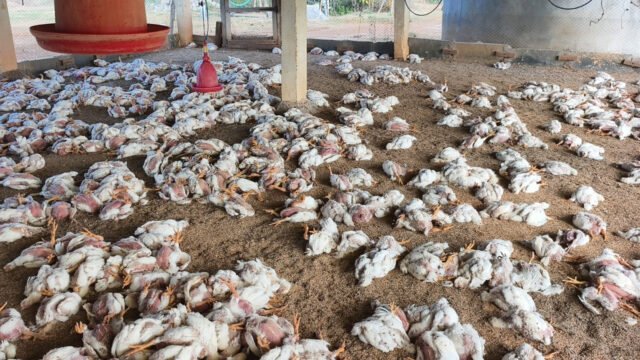Hyderabad: Amid fears of avian influenza, commonly known as bird flu, Hyderabad has witnessed a steep drop in chicken consumption and corresponding increase in the sale of fish and mutton.
Sabyasachi Ghosh, special chief secretary for animal husbandry department, instructed district collectors to remain on high alert for bird flu and ensure preparedness. He told them to strengthen biosecurity measures to prevent the spread of the virus and protect the poultry population and also raise awareness among farmers and other stakeholders.
On Tuesday, crowded chicken markets were found deserted. Despite the price of live chicken, set by associations and distributors, being over Rs 150 per kg, wholesalers are selling it for just Rs 80 per kg.
“We usually sell around 1,000 kg of chicken daily, both in retail and wholesale. Today, sales dropped to around 200 kg. We have been witnessing this decline for the past four days,” said Mohammed Iqbal of Tawakal Chicken Centre at Nampally Market, which is considered the main chicken supply hub in the city.
While mutton prices have remained stable, fish prices have surged. Srinivas, a wholesaler at Ramnagar Fish Market, said, “Demand has increased in both wholesale and retail. The price of Rohu fish, which was around Rs 100 per kilogram, has now risen to between Rs 120 and Rs 130. Murrel fish, previously Rs 400 per kg, is now costing Rs 500.”
Though this is the wedding season, when non-vegetarian dishes are typically served at receptions, many hosts are now opting to remove chicken from their menus.
Mustafa Majaz Hussain of a caterer group described the sudden shift in menu preferences: “There are a lot of weddings among Hindus, Muslims, and Christians. Because of the widespread bird flu news, hosts are modifying their planned menus, replacing chicken with seafood and mutton. They are willing to negotiate costs rather than risk raising concerns among their guests.”
Sanjeev Chintawar, assistant general manager of the National Egg Coordination Committee, told this newspaper, “There has been a drop in chicken sales since January 13, partly due to the ongoing Mahakumbh. The bird flu rumors may have caused around a 10 per cent decline.”
“Poultry farmers ensure that all necessary precautions and safety measures are followed before birds are sent for human consumption. In Telangana, 6 to 7 lakh chickens and 2 crore eggs are consumed daily,” he said.
“Bird flu was first recorded in 2006. Since then, we have observed occasional minor outbreaks, mostly during seasonal transitions, especially from winter to summer,” he said.
Dr Madhusudhan, assistant director of the animal husbandry department, said, “If there are any suspected cases of bird flu, samples will have to be sent to the High-Security Animal Disease Laboratory in Bhopal. If the virus is confirmed, a one-kilometre area around the site will be contained and quarantined. All chickens, both in poultry farms and domestic settings, will be culled, buried, and biosecurity measures will be implemented.”
Dr Ashish Chauhan, a specialist in internal medicine, stated, “Fully cooked chicken poses no health risks, but half-cooked chicken is not safe. With bird flu concerns circulating, my advice is to ensure that the chicken is alive and healthy before it is culled.”






